Staying healthy as a vegan is important, both for your own well-being but also for the movement as a whole. Showing you can thrive on plants is a powerful message and a beautiful way to live – that’s why we need to talk about how much B12 you need to take on a vegan diet.
If you’ve ever talked to someone about veganism or researched it on your own, you’ve probably come across the concern of nutrient deficiencies on a vegan diet. Most prominently, people are worried about vitamin B12.
And they often use having to take B12 supplements as a justification that a fully plant-based diet cannot be healthy because you don’t get all of your nutrients “naturally.”
We think that veganism doesn’t have to be “natural” to be a good concept, and the fact that you can be healthy as a vegan (at least as healthy as a meat-eater, if not even healthier) is enough of a reason to follow an ethical lifestyle.
This post contains affiliate links. As an Amazon Associate we earn from qualifying purchases.
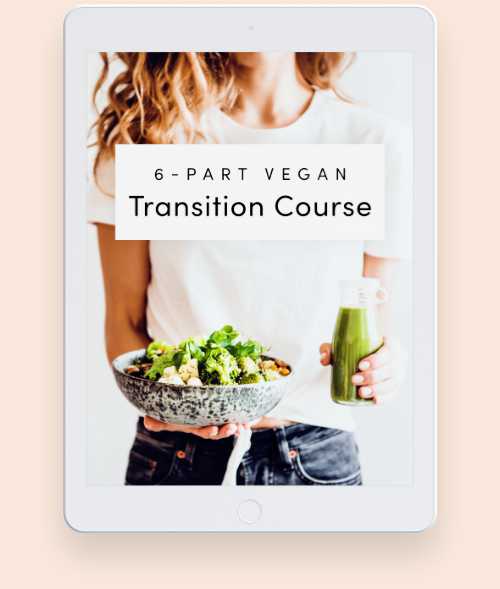
join our free vegan course!
Learn how to thrive on a plant-based diet with practical tips & a 3-day meal plan!
Let’s set the record straight and see what the research says!
According to the Academy of Nutrition and Dietetics, the largest organization of food and nutrition professionals representing over 100,000 credentialed practitioners:
“appropriately planned vegetarian, including vegan, diets are healthful, nutritionally adequate, and may provide health benefits for the prevention and treatment of certain diseases. These diets are appropriate for all stages of the life cycle, including pregnancy, lactation, infancy, childhood, adolescence, older adulthood, and for athletes.”
They further stated in their official position paper that while the low saturated fat and high intake of fruits and vegetables were both positive characteristics of a vegan diet, they do “need reliable sources of vitamin B-12, such as fortified foods or supplements.”
In this article, we want to take a look at where B12 actually comes from, what common sources are, how to detect deficiencies and all about B12 supplements.
What Is Vitamin B12?
Like all other B-Vitamins, vitamin B12 is a water-soluble vitamin. This means it can dissolve in water and travel through the bloodstream.
Just like B1, B2, B3, B6, B7 and B9, vitamin B12 is an essential nutrient – meaning your body cannot make it and you should consume it in appropriate quantities on a regular basis.
Whereas all of the other B-Vitamins are easy to come by on a vegan diet (foods high in those B-vitamins include whole grains, legumes, vegetables and seeds), it’s a different story for vitamin B12.
Our bodies can store B12, which can then last us for up to a few years depending on our physical situation and ability to absorb cobalamin (technical term for vitamin B12).
This isn’t to say that you can just disregard your B12 status and supplementation!
Where Does B12 Come From?
Believe it or not, B12 doesn’t come from animal products but from microbes (mainly bacteria) that are found in soil, water and the digestive tracts of animals – including humans.
Some plant foods like sea vegetables contain similar chemical compounds and are therefore called analogues. These analogues, however, do not offer the same nutritional value and thus can’t be used as a replacement or alternative.
Back in the day, we used to get B12 by drinking well water or by getting in contact with soil rich in organic matter as we didn’t wash our vegetables to the extent we do today.
Nowadays, we live in a world where our drinking water gets chlorinated to destroy any bacteria, and the soil that’s used in agriculture is highly sterilized so we get only minimal amounts of B12 from natural sources.
It’s true that there are bacteria in our large intestine that produce vitamin B12, but they live far away from the small intestine where the actual absorption takes place.
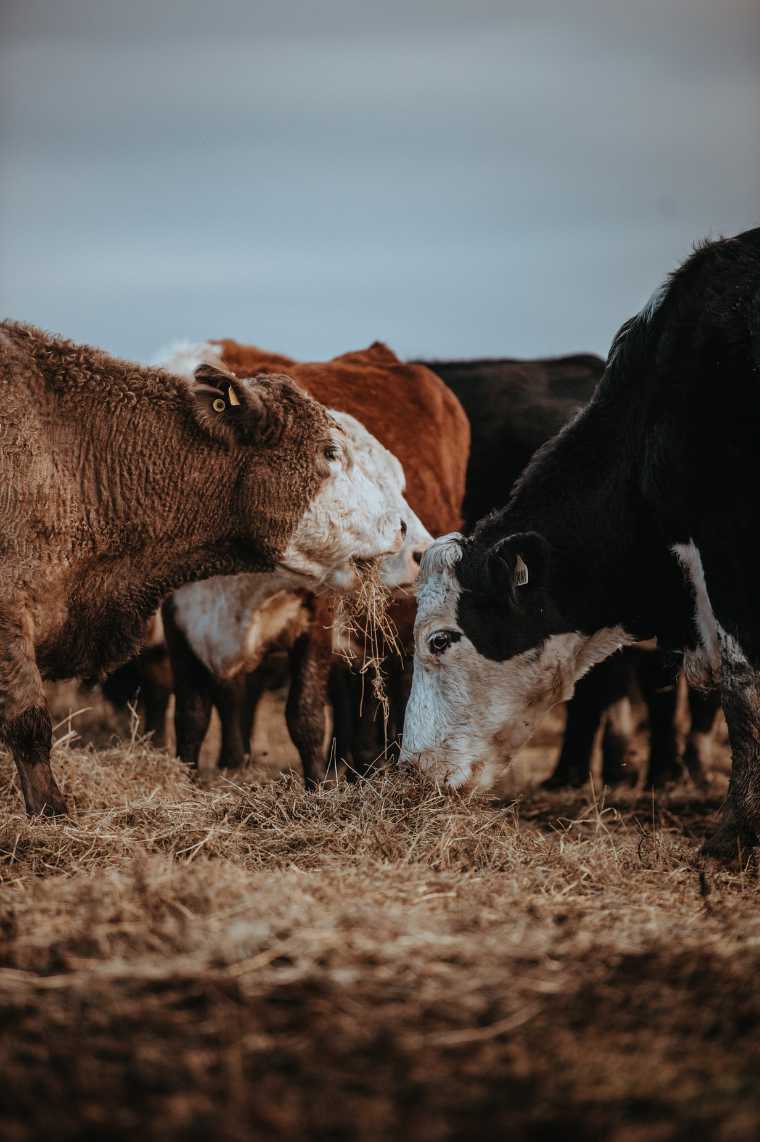
Where Do Animals Get This Vitamin?
Do animal products always contain a good amount of B12 naturally – or what’s the deal here?
Whereas B12 can be produced naturally in the digestive tracts of animals, meat and dairy products often contain high amounts of this vitamin because their feed is actually supplemented with B12. It can then accumulate in the animal’s body, which means a higher concentration for people who eat animal products.
Not only can their feed be already supplemented: these animals are also exposed to manure in their living conditions… with some even being fed manure.
In fact, the FDA has reported that most meats are contaminated with fecal bacteria, and cows are sometimes fed poultry waste.
Common Sources of B12
The reason why a B12 deficiency is oftentimes associated with plant-based diets is that the most common sources of B12 are animal-derived (some even call it “the meat vitamin”).
According to the National Institutes of Health, these are the foods with the highest amount of B12 per serving:
- Clams
- Beef liver
- Trout
- Salmon
- Tuna
- Nutritional yeast (fortified)
- Burger patty
- Milk
- Yogurt
- Fortified cereal
Whereas in the past there was a lack of knowledge about this vitamin and vegans didn’t supplement with it, the market for vegan food products has grown substantially – and luckily, many vegan foods nowadays are fortified with B12.
Vegan Sources of Vitamin B12
- Fortified cereal
- Fortified plant-based milk alternatives
- Fortified nutritional yeast
- Duckweed (water lentils)
- Some fermented foods, such as tempeh or Japanese black tea
- Some types of algae (especially nori)
- Dried shiitake mushrooms
- Fortified toothpaste
It’s important to note that the cobalamin found in foods need to be an active form and not just an analogue. These are not “just useless” to us but can actually be downright harmful!
Both our bodies and blood tests for B12 can confuse the real vitamin with the “pseudo version,” putting them into direct competition with each other. The more analogues we take in, the worse our bodies utilize real vitamin B12.
If you’re looking to meet large parts or your B12 needs via fortified foods, it’s important to check the nutrition facts labels on the products you buy.
The crystalline form of vitamin B12, which is the form used in fortified foods and supplements, is actually preferable to the protein-bound form present in animal foods because it’s generally easier for our bodies to absorb.
Delicious Pasta Featuring Cheesy Nutritional Yeast →New Findings – This Just In!
In 2020, researchers at Parabel discovered an actually reliable plant-based source of vitamin B12 in water lentils – and independent third-party testing confirmed that duckweed contains three types of natural bioactive B12: adenosylcobalamin, methylcobalamin, and hydroxocobalamin.
In addition to their naturally occurring vegan vitamin B12 resources, water lentils have been referred to as the world’s most complete food source as a result of their high levels and quality of protein, vitamins, and minerals in the plant.
The common argument that vegan diets cannot be healthy because they require “synthetic supplementation” really goes out the window with this discovery!
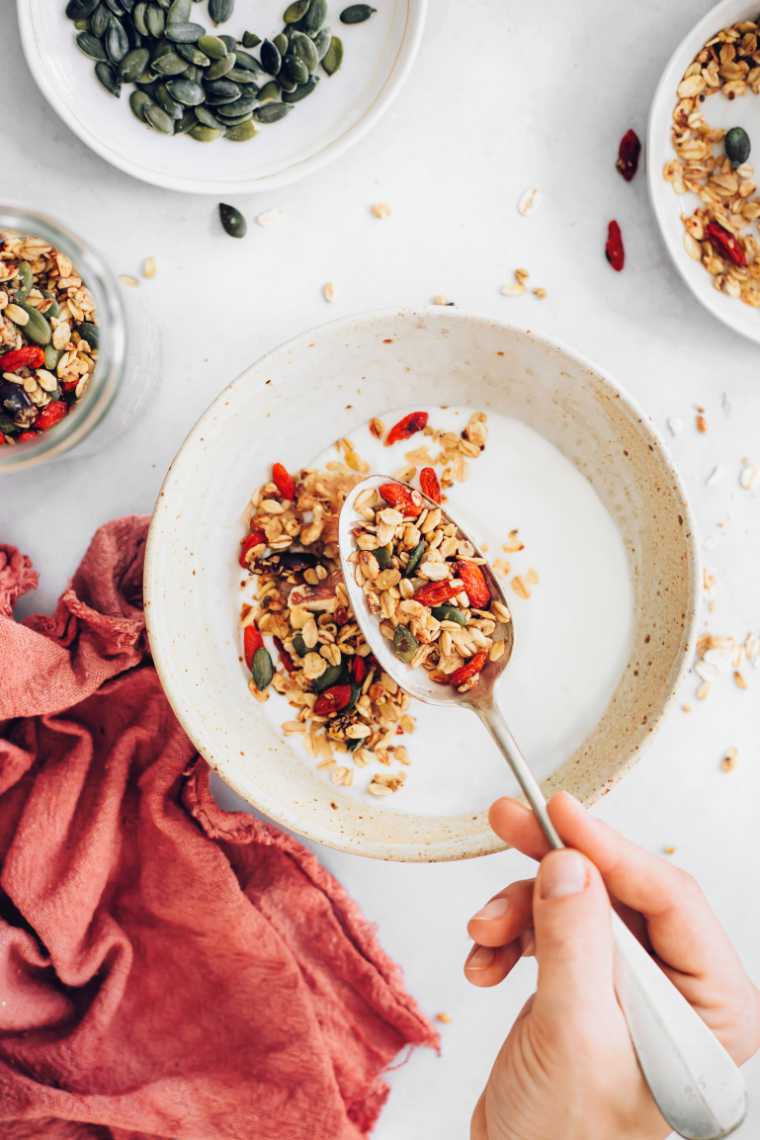
Vitamin B12 Deficiency & Symptoms
Getting a vitamin B12 deficiency is no joke. It’s responsible for a lot of things in your body, from helping to make DNA and blood cells to supporting the normal function of the brain and nervous system – so you want to make sure you’re covered.
If untreated, you can develop serious anemia that can lead to constant dizziness, weakness and degeneration of the oral and intestinal mucosa.
A long term vitamin B12 deficiency can also do sustained damage to the spinal cord and the central nervous system. This can cause uncoordinated movement, loss of reflexes, disturbance of memory or even psychoses.
Furthermore, a lack of B12 leads to increased levels of homocysteine in the blood, which results in an increased risk of atherosclerosis (damage of the arteries).
Who Is at Risk for Deficiency?
Whereas most people in developed countries get enough of this essential nutrient, some people are at a higher risk of becoming deficient in vitamin B12.
Not only those on a vegan diet need to pay attention to their B12 levels, but also people who have conditions that affect their small intestine, struggle with immune system disorders, pernicious anemia, regularly consume alcoholic beverages or are over 50 years old.
Because vitamin B12 is essential for a baby’s neural tube formation, brain and spine development, adequate intake is especially crucial during pregnancy. It works together with folate to ensure the production of red blood cells and supports nerve functioning.
When a pregnant woman becomes deficient, the risk for serious birth defects such as spina bifida increases. Be sure to check your status regularly, vegan or not!
Another group who is at risk for B12 deficiency are people dealing with pernicious anemia, in which case their immune system attacks the cells that produce an intrinsic factor needed for B12 absorption – making them much more likely to develop a deficiency.
As we previously mentioned, your body stores vitamin B12, and it can take several years until those B12 resources are depleted. If you’ve only just switched to a vegan or plant-based diet, you probably don’t need to worry.
However, getting a blood test done (more on that later) can be very helpful, especially since your stores can already be low (yes, meat eaters can also have low B12) and deficiencies might not show for several years.

Signs of B12 Deficiency
According to Harvard Medical School, B12 deficiency symptoms can include:
- Anemia
- Fatigue
- Weakness
- Soreness of the mouth and tongue
- Constipation
- Decreased appetite
- Weight loss
- Numbness and tingling in the hands and feet
- Dizziness, light-headedness
- Poor memory and confusion
If left untreated, these symptoms can worsen and cause irreversible problems involving the nerves and brain – the risk for heart failure also increases.
Proper Blood Testing
We all know that there is a huge range of nutrients that are essential for our health, but it’s hard to keep track of every single one of them. Luckily, we can have regular blood tests done to see if we’re meeting all of our nutritional requirements!
However, blood testing for B12 can be a bit tricky.
You need to ask for the right type of test – a regular blood test is not going to get the job done as it only measures the B12 in your blood, which isn’t necessarily being absorbed by your body. It also takes B12 analogues into account and can therefore indicate falsely high values.
To determine your actual B12 storage (the amount that can be utilized by your body), you need to specifically ask your doctor to measure the homocysteine- and methylmalonic acid (MMA)-levels in your blood.
Either or both of these values being high is a strong indication for a deficiency in B12, and you should start supplementing right away.
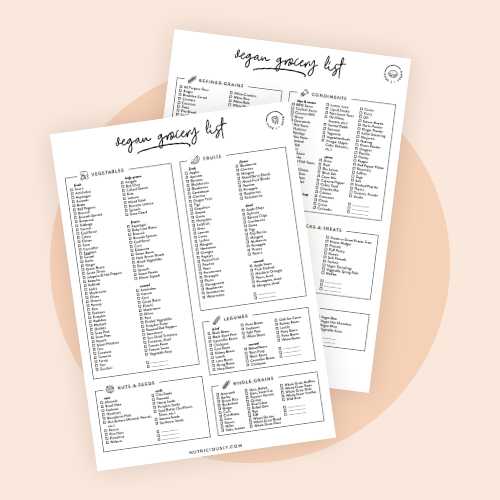
download our free printable vegan grocery list
Grab your free PDF and sign up for our newsletter by entering your email below!
How to Get B12 on a Vegan Diet
As mentioned before, B12 is kind of hard to get by eating plants alone. Even foods that are oftentimes regarded as good sources of B12 like seaweed or all kinds of fermented foods are not sufficient. They contain primarily vitamin B12 analogues that cannot be absorbed by your body.
In a best-case scenario, where you would only drink fresh spring water, grow vegetables in your own garden and consume them without washing off all the soil, you could be able to get a certain amount of B12 – but even then you can never be quite sure if you are meeting your needs.
There are lots of foods out there (especially plant milk or vegan meat alternatives) that are fortified with B12, but they usually also contain all sorts of other artificial additives and therefore can’t really be recommended.
The most convenient, cheapest and reliable option by far is: taking Vitamin B12 supplements.
The most reliable source of vitamin B12 is supplementation either with a tablet or a spray. You can also ensure you’re getting enough B12 as a vegan by regularly consuming fortified foods like plant-based milk, cereal or nutritional yeast.
Do Vegans Need to Take B12 Supplements?
Taking B12 on as a vegan is non-negotiable. Back when we transitioned to a vegan diet in 2012, this vitamin wasn’t even on our horizons, and we didn’t take any supplements at all for a couple of years – luckily, as we were exposed to more and more research on the topic, we let go of the idea that we could just get all of our nutrients “naturally” by eating plant-based food.
While there are some anecdotal cases of people following a strictly vegan diet without any supplementation and still having decent vitamin B12 levels even after years, there are no studies suggesting that you can get enough B12 on a vegan diet without any fortified foods or taking supplements.
The risk of a deficiency increases the more plant-based one eats, with long-term vegans being at the highest risk. A study published in the journal Nature showed that up to 86% of vegans were affected by vitamin B12 deficiency!
Fortunately, this can easily be prevented by taking a risk-free and cheap supplement and/or focusing on eating enough fortified foods.
What About Vegetarians & Meat-Eaters?
While it is true that animal products are the most common sources of vitamin B12, there is still a risk for vegetarians and even meat-eaters to develop a deficiency.
According to research conducted by Tufts University, 40% of the US population is deficient or low in vitamin B12! And those 40% surely weren’t all vegan.
Vegetarians are also at risk for becoming deficient in B12 as well as meat eaters who have absorption problems.
Also, we need to look at one’s diet as a whole, and since eating meat is correlated with a higher risk for mortality and higher chance of developing certain diseases, relying on it for your B12 intake is probably not the best idea.
This finding hopefully helps to bust some myths around how only vegans need to worry about this essential nutrient.
The Benefits of B12 Supplements
Taking B12 supplements has many benefits over trying to meet this nutritional need via your diet. The B12 content in foods can vary widely, and through supplementation, you can control how much you’re getting on a regular basis.
It’s a cheap and easy way to prevent deficiencies, especially for vegans and vegetarians.
But since simply eating animal products doesn’t automatically ensure adequate vitamin B12 intake, it’s a good idea to get your levels checked anyway and act according to your results.
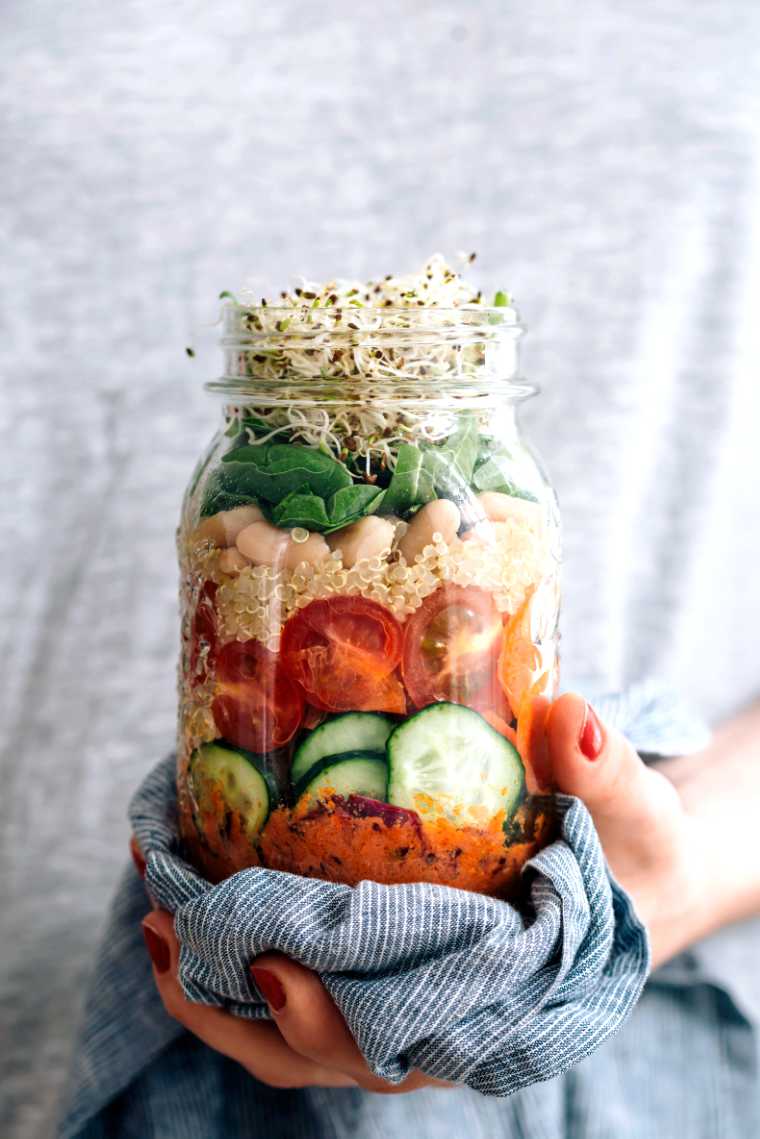
How Much B12 Should I Take on a Vegan Diet?
Depending on your age, eating habits and medical conditions, there are different recommendations for how much B12 you should take on a vegan diet.
You can either take B12 supplements on a daily basis (absorption, smaller amount) or 1-2 times per week (larger doses).
The Vegan Society states that the following ways of supplementing with vitamin B12 are recommended:
- Eat fortified foods two or three times a day to get at least three micrograms (mcg or µg) of B12 a day.
- Take one B12 supplement daily providing at least 10 micrograms.
- Take a weekly B12 supplement providing at least 2000 micrograms.
Officially Recommended Dosage
You might be wondering how much B12 you should take per day. According to WebMD, this is how much different groups of people need daily:
- Infants up to age 6 months: 0.4 mcg
- Babies age 7-12 months: 0.5 mcg
- Children age 1-3 years: 0.9 mcg
- Kids age 4-8 years: 1.2 mcg
- Children age 9-13 years: 1.8 mcg
- Teens age 14-18: 2.4 mcg (2.6 mcg per day if pregnant and 2.8 mcg per day if breastfeeding)
- Adults: 2.4 mcg (2.6 mcg per day if pregnant and 2.8 mcg per day if breastfeeding)
When looking for vitamin B12 supplements, you will find that the dosages are much higher than these numbers – typically between 250 mcg-5000 mcg per dose.
This is because these high-dose supplements can usually compensate for the body’s poor absorption. The different doses also allow you to either take smaller amounts of B12 every day or larger doses once per week.
Is a Vitamin B12 Dosage of 5000 mcg Safe? Can You Get Too Much?
Vitamin B12 is water-soluble, so it’ll be hard to really go overboard here – your body simply gets rid of any excess.
Until today, no Tolerable Upper Intake Level (the maximum daily dose of a vitamin at which it may cause adverse side effects) has been established for B12, due to its low level of toxicity.
In cases of severe B12 deficiency, or if you’re dealing with absorption issues, it can make sense to go as high as 5000 mcg.
For most of us, such high doses are probably unnecessary. We highly recommend that you talk with your health team about how much you personally should supplement with.
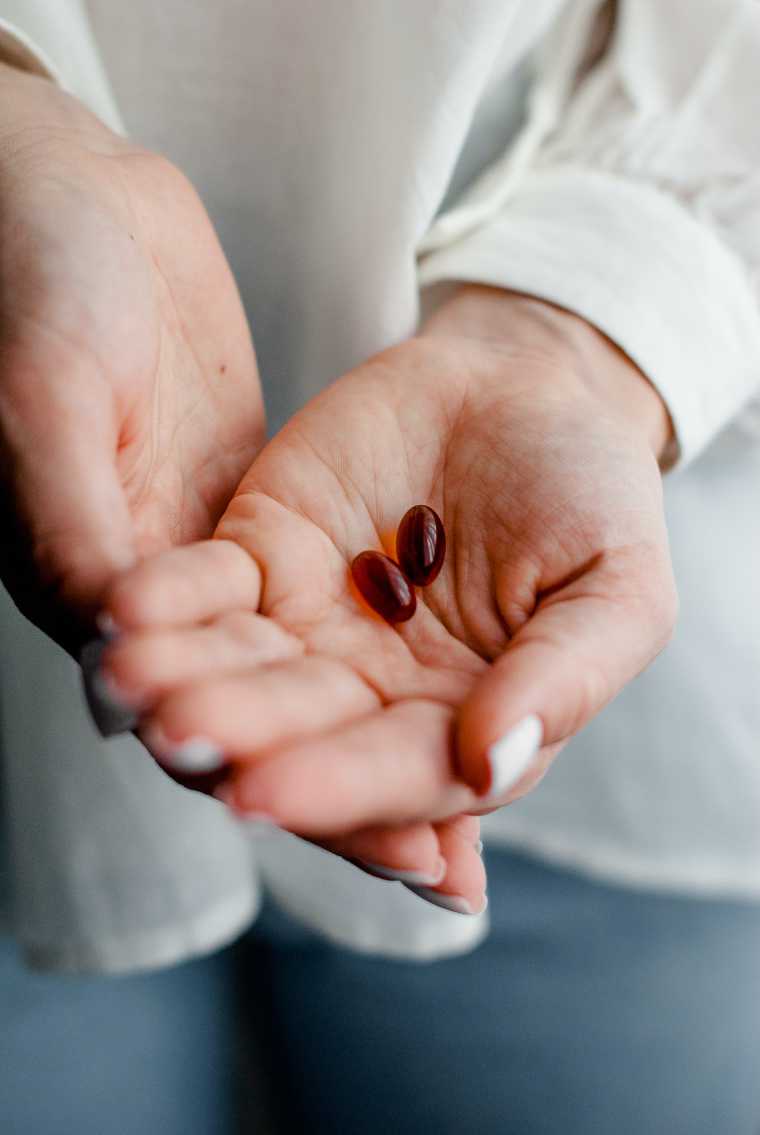
The Different Types of Cobalamin
- Methylcobalamin
- Cyanocobalamin
- Hydroxocobalamin
- Adenosylcobalamin
Methylcobalamin is the most active and natural form of B12. It absorbs easily, doesn’t need any converting and can enter the bloodstream sublingually (under the tongue).
However, most studies that have been done on B12 used Cyanocobalamin, and it’s therefore considered an effective and reliable form as well.
Cyanocobalamin vs Methylcobalamin
As we just mentioned above, there are different types of vitamin B12. Methylcobalamin is found naturally and contains a methyl group, whereas cyanocobalamin is a synthetic form of B12 that comes with a cyanide molecule.
When cyanocobalamin enters your body, it’s converted into either methylcobalamin or adenosylcobalamin, which are the two active forms of vitamin B12 in humans.
Fortified foods and most supplements contain cyanocobalamin because it’s very cost-effective and the most stable form of B12.
Dr. Greger from Nutrition Facts recommends supplementing with cyanocobalamin specifically, as there is insufficient evidence to support the efficacy of the other forms like methylcobalamin.
Types of B12 Supplements
B12 supplements come in many shapes and sizes! This is great because there’s something for everyone – we have different flavors, dosages and use cases. Let’s take a look.
- B12 tablets or pills: These are the most common forms of B12 supplements and come in different dosages and flavors. You may want to choose a combination of B12 + D3 on a vegan diet. These inexpensive forms of supplements are available at many local stores and online.
- B12 sprays: Easy, convenient and perfect for those who deal with gastrointestinal issues. Because the vitamin B12 in the oral spray is absorbed by your mucosa, this can be the smarter choice!
- B12 shots or injections: No worries, you most likely don’t need one of these! People with severe signs of B12 deficiency or who are at high risk might benefit from injections rather than tablets. They are only given by medical professionals.
What Is the Best B12 Supplement?
Obviously we recommend that you first check whether the supplement is actually vegan and doesn’t contain any gelatine or lactose (yup, this can happen!).
Next, choose whether you want to get a tablet or spray – these are the most common types of supplements.
You’ll also want to decide whether you want to take smaller amounts daily or larger doses weekly. Here are a few options you can order online:
What Supplements to Take on a Vegan Diet
If you’re following a mainly or fully plant-based diet, you don’t need to follow strict guidelines or track your food every single day to ensure that you’re covered.
In general, eating from all the 5 main vegan food groups plus taking a vitamin B12 supplement is all we need to stay healthy on a plant-based food diet.
While it makes sense to focus on some specific, highly nutritious foods such as green leafy vegetables or omega-3 rich nuts and seeds, no complicated planning is necessary.
Every diet comes with some critical nutrients and, therefore, needs to be well-planned. It does make sense to loosely track your food intake for a few days to get an idea and to have occasional blood tests done.
Other than vitamin B12, which is definitely necessary to supplement, everyone needs to check individually to see which nutrients they might be lacking. Common supplements plant-based eaters can benefit from are vitamin D, iodine and omega-3.
Please work with a health professional on ensuring you eat a healthy plant-based diet that meets your individual needs!
For more information on what a well-rounded vegan diet looks like, including critical nutrients, vegan food groups and a full-blown vegan food pyramid, check our in-depth article below.
Full Vegan Nutrition Guide + Downloads →In a Nutshell
- Vitamin B12 is the most critical nutrient for vegans and needs to be obtained by supplementation or fortified vegan food
- Our bodies have B12 stores which can last us for a few years, so immediate supplementation might not be necessary for everyone
- We need B12 for normal brain function, our nervous system, to make red blood cells and create DNA
- Deficiency symptoms include fatigue, anemia, sore mouth or tongue and dizziness
- You can choose between B12 tablets, sprays, gummies and shots
- Get regular blood tests done to ensure an adequate intake of essential nutrients, including vitamin B12
- Not only vegans but also vegetarians, seniors, pregnant women and people with absorption issues need to ensure they have an adequate B12 supply
We hope you enjoyed our deep dive into B12 on a vegan diet and know how much you should take on a regular basis.
Was there anything new you’ve learned? Which supplements do you take? Share with us in the comments below and don’t forget to check out our other vegan nutrition guides.


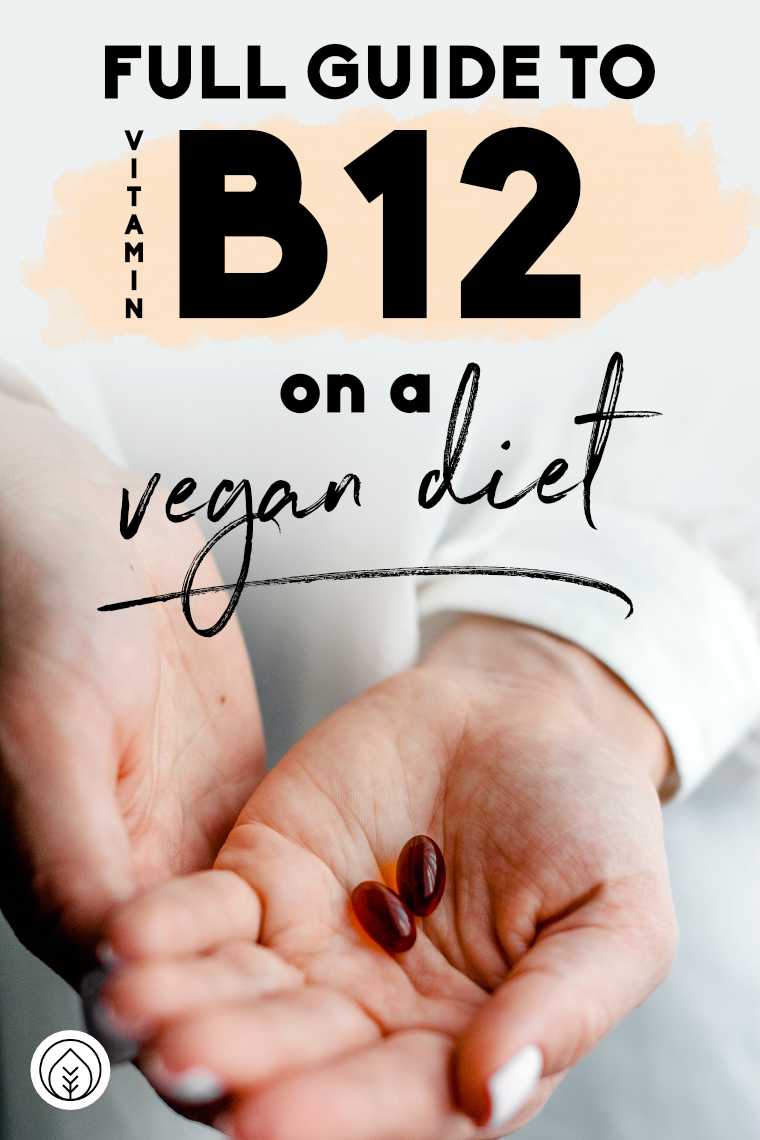



 Alena Schowalter is a Certified Vegan Nutritionist who has been a vegetarian since childhood and vegan since 2012. Together with her husband, she founded nutriciously in 2015 and has been guiding thousands of people through different transition stages towards a healthy plant-based diet. She’s received training in the fields of nutrition, music therapy and social work. Alena enjoys discussions around vegan ethics, walks through nature and creating new recipes.
Alena Schowalter is a Certified Vegan Nutritionist who has been a vegetarian since childhood and vegan since 2012. Together with her husband, she founded nutriciously in 2015 and has been guiding thousands of people through different transition stages towards a healthy plant-based diet. She’s received training in the fields of nutrition, music therapy and social work. Alena enjoys discussions around vegan ethics, walks through nature and creating new recipes.
I believe the B12 topic is really confusing, some doctors like Dr. Michael Greger suggest we supplement the cyanocobalamin form because most studies have been done using that form. And the few studies done on methylcobalamin showed some problems. Apparently also Dr. John McDougall changed his opinion and started prescribing cyanocobalamin instead of methylcobalamin.
I think Mic. The Vegan has a nice video about B12 and he also agrees on cyanocobalamin.
https://youtu.be/t3j80WpjM0M
What are your thoughts? Where did you get your information about methylcobalamin being a better version for us.
This is the link where the Methylcobalamin is suggested:
http://www.onegreenplanet.org/natural-health/the-top-things-to-look-for-when-choosing-a-vitamin-b12-supplement/
More I search for this subject, B12, more confused I get…sad.
elena
I totally understand, Elena – we usually follow Dr. Greger on most things. But I assume that it doesn’t really matter too much which B12 you take. Most importantly, take one! :)
Hi. I have a 5 years old vegan kid from birth. Can you please suggest how much kids need to supplement B12?
Thank you.
Hello!
My doctor recently recommended a B12 injection due to a low normal range of it through a blood test. I had the worst breakout of my life, and my skin is still trying to go back to being smooth a month later. Has anyone noticed this happening with just the pills?
Thank you!
Is there a supplement that has vitamin B12, D, Iodine and Omega 3 all in one tablet or spray? I’m a lazy newbie????
so far, I haven’t found any! This totally depends on the online store, too, but omega-3 is usually taken separately. There are vegan multivitamins (such as deva) but you’d need to get omega-3 additionally if you want to take it. Research isn’t totally clear on whether or not this is necessary on a vegan diet because people have varying abilities to form omega-3 out of the plant-based precursors found in nuts and seeds.
Hope this helps!
“The worst that can happen is that you end up having expensive pee.”
Well, not quite. When I transitioned to a vegan diet about a year ago, I thought I’d play it “safe” and started taking a 200 µg daily dose of B12 (2 ml a day from a dropper thingy).
About two or three months in my skin went CRAZY. I got horrible acne, way worse than during puberty. I thought it was some weird hormonal thing and didn’t link it to the B12 supplement because I had no idea that B12 levels can affect the bacteria living on your face. I didn’t find out until about 3 months ago and stopped supplementing after reading an article (that I can’t find again now, d’uh) about it. It said that it can take up to 6 weeks for the skin to clear but I’m actually still working through it. Since the body can store B12 for years it may actually cause skin trouble for quite a while.
I’m still not quite sure how and when to start supplementing again, let alone at what dosage. For now I’m “counter supplementing” with turmeric daily which has helped by reducing the inflammation. But it’s not fun.
Anyway, I just wanted to chip in and offer a word of caution. I know we’re all supposed to check back with our healthcare providers before supplementing but realistically, most of us just buy the over the counter stuff if someone recommends it. especially when we read things like “The worst that can happen is that you end up having expensive pee.” (:
xo
Thank you so much for this very informative article! You answered some of my questions!
Alena, thank you so much for this detailed information. You’re the best!